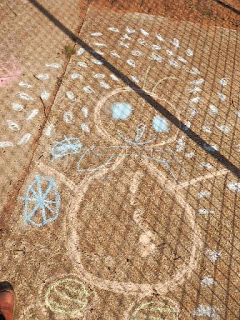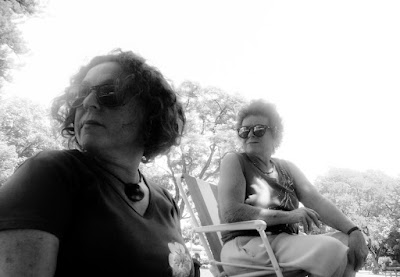Using the power of observation to create poetry
 |
| Snowman, chalk on concrete |
I've recently been spending my
Sundays with some wonderful folk in a park in Berri, South Australia. You can
read details about the Manifold Project here and here, but in a nutshell it's spearheaded by the
innovative and enthusiastic Alysha, Hermann, and is an invitation for local
residents to tell their stories in collaboration with professional artists (I'm
one of those). Alysha sees this project as long term (as in, years) so we're
only just scratching the surface. What I want to do in this blog is demonstrate
how I harness that power of observation I've talked in previous blogs to create
new work as part of a project. In this case, the new work is poetry. But first,
a little context ...
Berri is in South Australia's
Riverland, and like everything else in the Riverland, Rotary Park on Manifold
Crescent has been affected by the recent, severe drought. Water restrictions
meant the council stopped watering the park. Trees died. Grass perished.
According to Yvonne, a resident of thirty years, the park became ‘a dustbowl’.
With typical Australian humour and penchant for telling it how it is, she now
refers to the place as Prickle Park. Dry humour to match a dry park.
To find Prickle Park you drive
through Berri’s town centre on Kay Avenue and turn left into Derrick Street
(opposite the precinct that includes the Library and Information Centre). The
park is straight ahead of you. If you turn right at the Rotary Park sign you
continue into Derrick Street; turn left and that’s Manifold Crescent.
Bob, Yvonne’s daughter (yes, that’s right) who grew up on Derrick St opposite
the park, says ‘Derrick Street has always been a race track.’ When I look it up
on Google Maps, I see that Derrick Street makes a perfect (half) race track: No
intersections, a good long length with just enough windiness to keep it
interesting for the driver. A most excellent road for the souped up,
mag-wheeled, vroom-vroom machines we heard and saw throughout the day, their
bright green and red finishes gleaming in the winter sun, a kind of blaring
creature example of that most ubiquitous of Australian accessories, the car.
Manifold Crescent, it seems to me, is Derrick Street’s little sister and is, in
contrast, a smaller quieter street used more or less solely by the residents,
ignored by everybody else.
Fenceless and gateless, the park
invites us in.
It's the third Sunday in August,
getting closer to spring and the weather shows it. It’s a day full of sunshine
with fast moving clouds obscuring the heat and light from time to time,
prompting me to reach for my jumper. Still, it’s warm enough for Winifred
(Winnie), one of the kids who joined us to chat and make art, to be wearing her
bathers, her jumper a mere accessory tied around her waist all afternoon. In a
moment of pure joy she looked up, face tilted at the sun, eyes squinting, and
exclaimed ‘Finally! It’s a sunny day to go outside and play in the park!’ I was
struck by the pure pleasure on her face and in her voice. Enjoying a sunny day.
Such simple a pleasure, isn’t it? Sometime it takes a child to remind us how
lucky we are. Of course, there is more to Manifold Crescent than sun-shiney
days, but that's another story for another time.
At home the next day I was trying
to conjure up what David Foster Wallace refers to in his essay A supposedly
fun thing I'll never do again as "a kind of hypnotic sensuous collage
of all the stuff I've heard and done ..." It's true that he was writing
about having just spent 7 days on a luxury cruise liner, and a day in the park
with some kids in Berri may seem a little smaller, but who am I to
reduce my own experience? When your senses are open, every experience
has a little magic. And anyhow, the point is about the detail of observation. I
read my notes, looked at the photographs I took and thought about what
resonated with me the most, where the energy was, and the answer was - with the
children and play. And then a poem began to take shape incorporating
play, the comments and conversation we had (direct speech being an
important sensuous detail) and the comings-and-goings of the afternoon. Here is
the result. Have a go yourself. How can you utilise all that detail that you've
written into a new work of art?:
Into Spring
Winnie’s face is tilted toward the
late-winter sun.
Finally! she says. It’s a sunny
day to go outside and play in the park.
I can hear the wind, says Darren.
It sounds like air, like breath.
Eugene says, I can hear paper
rattling.
I can hear leaves.
I can hear the shovel scraping on
the ground.
Sounds like a fart, says Darren.
I can see snow, letters, words,
sentences, colours, leaves, dirt, rocks, sticks, says Eugene.
He holds a metal spade
Darren holds the bucket
The brothers work together to
clear the cricket cage of dirt and leaves
They work fast
They tip the dirt over by one of
the trees
The falling dirt is gentle,
a soft sound
None of us can say exactly what it
sounds like
but we know what it doesn’t sound
like
The falling dirt does not sound
like a waterfall,
or drums, says Eugene.
or the radio.
The cage looks much better when
they have finished clearing it out
There is a whipper snipper
and a saw going in someone’s
backyard
I can hear talking, says Darren.
A cockatoo, says Eugene.
I can hear brothers talking, I say.
That doesn’t count, says Darren.
Yes it does, says Eugene.
Winnie uses pink chalk to draw a
love-heart on the cement
She colours it in,
a big fat pink love-heart right there on the concrete
Alysha draws
and writes
and takes photos
Bob sketches in a notebook
Jess uses green and purple wool
to weave a sculpture
We all look up when we hear
a souped up
mag-wheeled
vroom-vroom machine,
a kind of blaring creature,
its sparkly green finish gleaming
in the winter sun,
a bright example of
that ubiquitous Australian
accessory –
the car.
Derrick Street has always been a
race track, Bob
says quietly,
matter-of-factly.
We all nod.
They car disappears up the street
We all go back to what we are
doing
Jess says, Lavender is my
favourite flower.
Winnie says, I put lavender in
my shoes to make them smell nice.
Jess makes a lavender stalk
sculpture out of the green and purple wool
She weaves it into the cage
Winnie, Eugene and Darren go home
See yas next time.
She weaves it into the cage
Winnie, Eugene and Darren go home
They come back
The bike belongs to Darren
His brother asks if he can use it
You can’t miss Eugene
He wears a bright orange jumper,
dinking his brother over the
cement pitch
across the concrete
across the prickles and grass in
Prickle Park
They giggle all the way
We meet a chihauhau named Lady
Winnie says I remember when
there was three mounds here in the park.
She points them out. One, two,
three.
We could sit on them.
In the shade?
In the shade.
Winnie says, When they put
seeds here it’s going to be like a jungle.
Darren says, I’m bored.
But he stays.
Winnie goes home
She comes back with oranges for
everyone
She says, Eugene has to put out
the washing.
Eugene goes home to put out the
washing
Then he comes back
Do you like it? asks Winnie.
I suck on the sweet juicy orange
It’s delicious, I say. Thankyou.
I spy an abandoned black sock
a pair of green shoelaces
Winnie’s Mum calls them to go home
I mean it, you kids!
See ya, we say
See ya next time.
See yas, they say
White moths flit over the grass in
Prickle Park
A blowie hums close by, buzzes
past my ear
It might be the first fly of the
season






Comments